Nourish Your Body With Sleep (FN1854, July 2017)
Availability: Web only
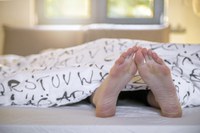
Sleep Cycles
We all need sleep, but our needs vary depending on our age. Sleep and wake cycles are balanced and driven by our body’s biological clock, which is a natural body pattern. Rapid eye movement (REM) and non-REM are sleep levels, or cycles, during sleep.
Aim for your age group’s recommended range of sleep.
Test Your Knowledge
T/F: Decreased sleep is associated with increased body weight.
T/F: Sleep affects hormones that can lead to an abnormal appetite.
T/F: Leptin is a hormone that helps you know when you are full. It also is reduced with insufficient sleep.
Answers: True, True, True
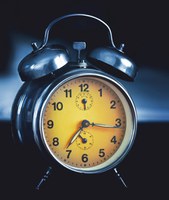
Sleep Hygiene: Dos and Don’ts
Ask your doctor before taking sleep aids. Discuss unrelated medications because they could cause side effects that disrupt sleep. Consistent travel and a stressful work schedule are common sleep disturbances, too.
Sleep hygiene refers to practices that help ensure a good night’s sleep. Write DT if you think it’s a “don’t” or a DO if you think it’s a “do.”
1. ____ Warm temperature in the bedroom.
2. ____ Bed sheets washed weekly.
3. ____ Quiet and dark room.
4. ____ Use a computer tablet in bed.
5. ____ Consume alcohol, caffeine or nicotine before bed.
6. ____ Keep your phone next to your bed.
7. ____ Combine a lavender scent in the bedroom with good sleep hygiene practices.
8. ____ Exercise as part of your lifestyle not only for good health but for better sleep, too.
Answers: 1. DT 2.DO 3.DO 4.DT 5.DT 6.DT 7.DO 8.DO
Lavender
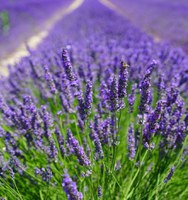
Extracted oils from the lavender plant can be used in aromatherapy, in which the scent is inhaled. When combined with sleep hygiene practices, it has shown promising results for promoting sleep. However, be aware that some people are allergic to lavender.
Exercise
Try to fit exercise into your schedule to help you see better sleep results. Consistent exercisers experience the best quality and quantity of sleep. If you are not exercising, start with moving around more throughout the day, such as going for a walk on your lunch break. Incorporating more structured exercise into your lifestyle can benefit sleep and overall health.
Can certain foods promote better sleep?
Research is going strong on the topic of sleep and mixed results have been reported. Therefore, think of these as suggestions:
- Tryptophan, a protein building block found in many foods (for example, turkey and milk), helps your body produce a hormone, melatonin, which aids in falling asleep.
- Lacking in B vitamins can make producing melatonin naturally difficult for your body. Foods rich in B vitamins include fortified grain foods and milk. How about a bowl of fortified cereal and milk as a bedtime snack?
- Eating two kiwi fruits about an hour before bed may be beneficial to falling and staying asleep.
- “Sleep tea” has become popular, yet research has yet to completely back up its impact on sleep quality.
- Consuming a dinner or evening meal containing higher fiber and protein with less saturated fat can improve sleep results.
5 Things to Do
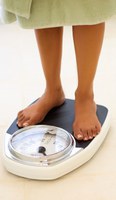
- Practice sleep hygiene tips.
- Consume a balanced, healthful diet.
- Limit caffeine, alcohol, cigarette smoking and media/technology before bedtime.
- Maintain a healthy weight.
- Incorporate physical activity into your daily routine.
Tip 1: Keep your phone out of the bedroom at night. Leave it in the kitchen or living area to avoid unnecessary interruptions such as notifications, calendar reminders and phone calls that could wait until morning.
Tip 2: Too much sleep and not enough sleep can be hard on your body. Aim for your age recommendation range.
Tip 3: Practice a routine of going to bed about the same time every night and waking up about the same time every morning. Challenge: Do this even on the weekends!
More Information:
*Sleep.org
Centers for Disease Control and Prevention
National Sleep Foundation
*most user-friendly site
Test your knowledge
Circle the items that may benefit sleep:
Fiber-rich meal Kiwi Alcohol
Lavender Exercise Vitamin C
Television Caffeine Travel
Turkey Healthy weight
Answers: Fiber-rich meal, Lavender, Exercise, Healthy weight, Kiwi, Turkey
National Sleep Foundation Recommendations
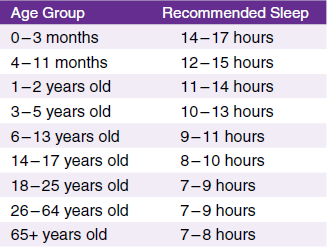
August 2017


